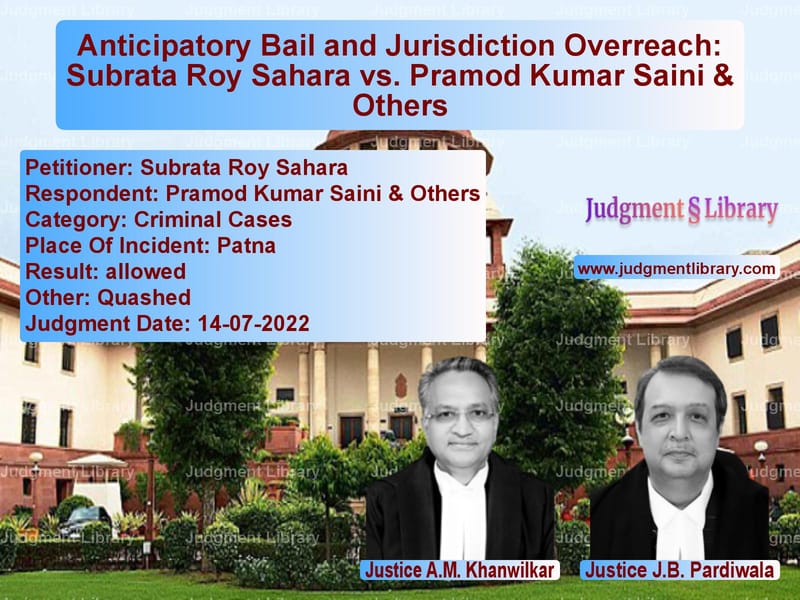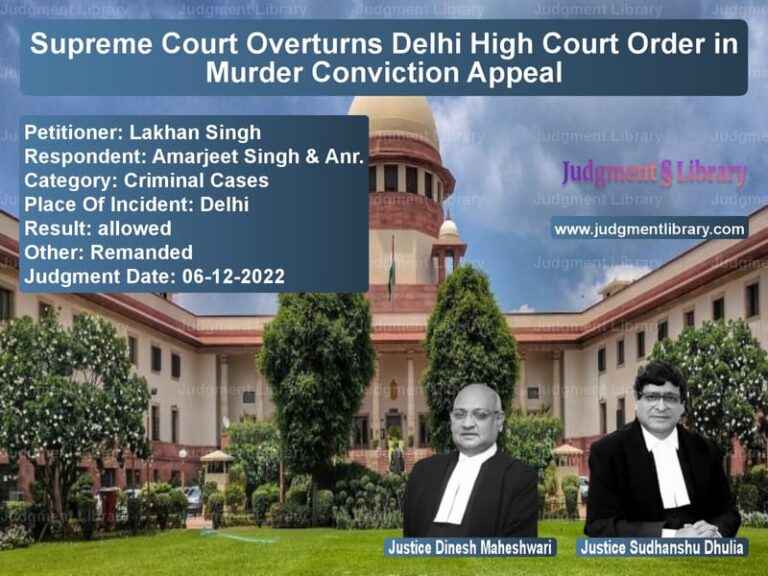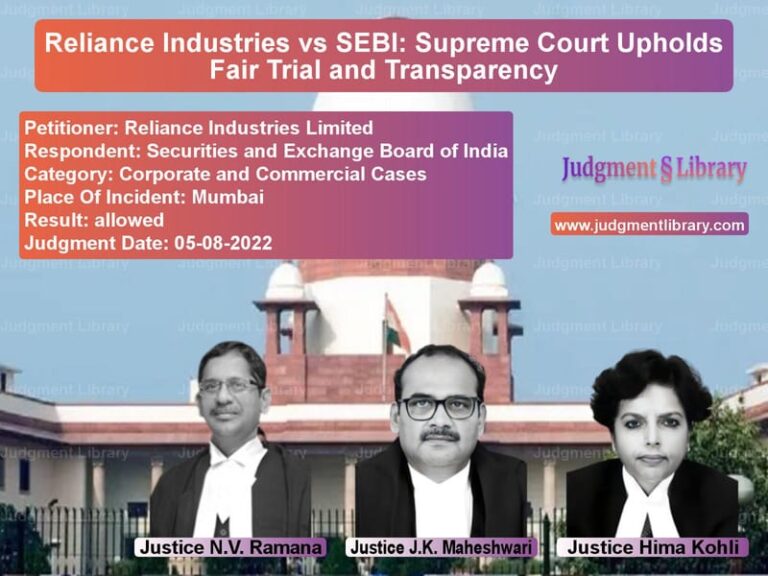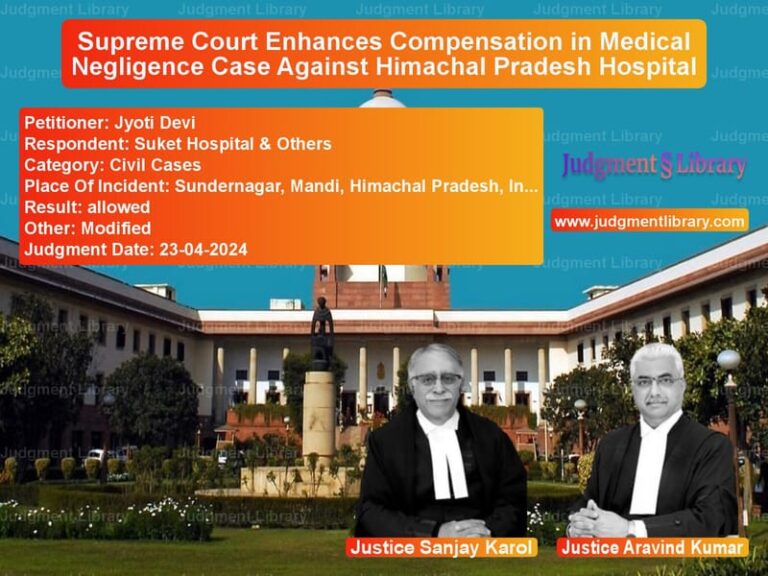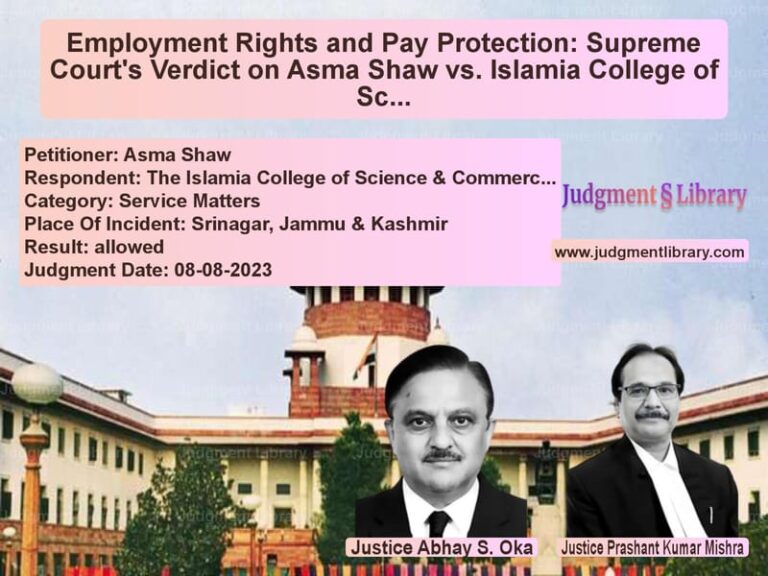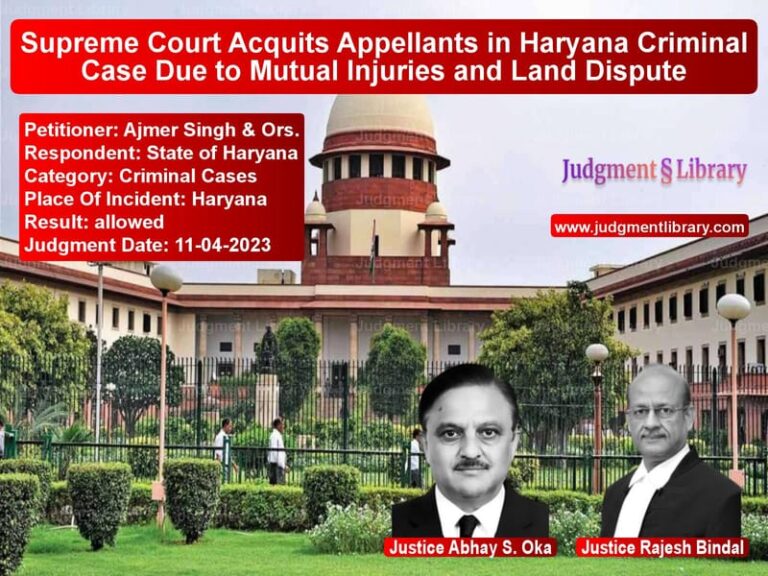Anticipatory Bail and Jurisdiction Overreach: Subrata Roy Sahara vs. Pramod Kumar Saini & Others
The case of Subrata Roy Sahara vs. Pramod Kumar Saini & Others highlights critical legal issues concerning anticipatory bail applications and judicial overreach. The Supreme Court was called upon to review a judgment by the Patna High Court, which went beyond its jurisdiction while deciding an anticipatory bail application, leading to intervention by the apex court.
Background of the Case
The case arose from a private complaint, Complaint Case No. 1761 of 2016, filed by one Naresh Kumar Das against multiple accused. Among them, Pramod Kumar Saini, named as Accused No. 4, applied for anticipatory bail under Section 438 of the Code of Criminal Procedure (CrPC). However, the High Court, while hearing his bail application, made extensive observations on matters unrelated to the bail plea and even issued notices to third parties, including Subrata Roy Sahara, who was not an accused in the case.
The petitioner, Subrata Roy Sahara, challenged these orders in the Supreme Court, arguing that the High Court had exceeded its jurisdiction.
Arguments by the Petitioner (Subrata Roy Sahara)
The petitioner’s counsel, Mr. Kapil Sibal, contended that:
- His client was not named as an accused in the complaint.
- The High Court’s observations and directions in an anticipatory bail plea were impermissible and exceeded the scope of such proceedings.
- The High Court’s order effectively implicated the petitioner in a case where he was neither an accused nor a party to the proceedings.
- The order directing authorities to produce the petitioner before the court was beyond the legal framework governing anticipatory bail applications.
Arguments by the Respondents
The respondents, represented by Mr. Manish Kumar and others, defended the High Court’s order, arguing:
- The High Court was taking a broad view of the matter to ensure a thorough inquiry into all aspects of the case.
- The observations made were necessary to uncover the larger conspiracy and financial irregularities.
- The High Court had the inherent power to issue directions to facilitate the investigation.
Supreme Court’s Observations
The Supreme Court, led by Justices A.M. Khanwilkar and J.B. Pardiwala, found merit in the petitioner’s arguments and strongly criticized the High Court’s approach. The court held:
“An application under Section 438 of the Code of Criminal Procedure is limited to the cause of the concerned applicant applying for anticipatory bail in connection with an offense already registered against him and apprehending his arrest in connection with such a case for extraneous reasons or otherwise. In such proceedings, the inquiry must be limited to the facts relevant and applicable to the concerned applicant who has come before the court.”
The apex court made the following key observations:
- The High Court should not have delved into matters beyond the anticipatory bail application.
- In a bail application, the inquiry should be limited to the facts relevant to the applicant, and no attempt should be made to inquire into third parties not named in the case.
- The High Court’s order to issue notices to third parties and summon individuals not connected with the anticipatory bail application was impermissible and exceeded judicial jurisdiction.
- The High Court had no authority to summon individuals not listed as accused under the guise of an anticipatory bail proceeding.
Supreme Court’s Final Ruling
The Supreme Court set aside the High Court’s order and clarified:
“Accordingly, all the observations or notings made by the High Court in respect of matters unrelated to the case of the applicant before the High Court must stand effaced from the record, in law. The same cannot be looked at or relied upon in some other proceedings against third parties.”
The Supreme Court further ruled:
- The anticipatory bail proceedings should be confined strictly to the accused seeking relief.
- The High Court had exceeded its jurisdiction by dragging in unrelated parties.
- The State was free to take separate legal recourse for investigating any additional allegations but could not do so through a bail application.
- The High Court’s observations against third parties were to be erased from legal records and could not be used in any other case.
Significance of the Judgment
The Supreme Court’s decision serves as a critical precedent on the limited scope of anticipatory bail applications. The ruling reinforces that:
- The anticipatory bail process must remain focused on the applicant’s apprehension of arrest.
- The High Court or Sessions Court cannot expand the scope of inquiry beyond the applicant and delve into unrelated matters.
- Courts must exercise restraint and not act beyond their jurisdiction, particularly in bail proceedings.
- Judicial overreach in criminal proceedings must be avoided to uphold the principles of fair trial and due process.
Conclusion
The Supreme Court’s ruling in Subrata Roy Sahara vs. Pramod Kumar Saini & Others sets a clear boundary for courts dealing with anticipatory bail applications. It reiterates that such proceedings must remain limited to the accused seeking bail and should not be misused to introduce extraneous matters or implicate third parties. By striking down the Patna High Court’s order, the Supreme Court reaffirmed the necessity of judicial discipline and the principle that courts should function strictly within the framework of the law.
Petitioner Name: Subrata Roy Sahara.Respondent Name: Pramod Kumar Saini & Others.Judgment By: Justice A.M. Khanwilkar, Justice J.B. Pardiwala.Place Of Incident: Patna.Judgment Date: 14-07-2022.
Don’t miss out on the full details! Download the complete judgment in PDF format below and gain valuable insights instantly!
Download Judgment: subrata-roy-sahara-vs-pramod-kumar-saini-&-supreme-court-of-india-judgment-dated-14-07-2022.pdf
Directly Download Judgment: Directly download this Judgment
See all petitions in Bail and Anticipatory Bail
See all petitions in Legal Malpractice
See all petitions in Other Cases
See all petitions in Judgment by A M Khanwilkar
See all petitions in Judgment by J.B. Pardiwala
See all petitions in allowed
See all petitions in Quashed
See all petitions in supreme court of India judgments July 2022
See all petitions in 2022 judgments
See all posts in Criminal Cases Category
See all allowed petitions in Criminal Cases Category
See all Dismissed petitions in Criminal Cases Category
See all partially allowed petitions in Criminal Cases Category

